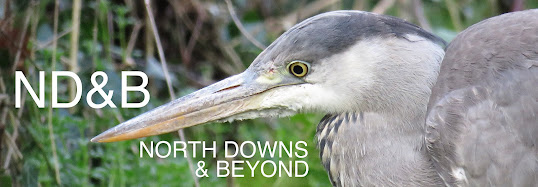Why Canons Farm?
I was trying to explain to a Devon-based birder the reason behind Canons Farm (close to Banstead, Surrey) becoming a regularly worked site. I struggled, to be honest, to bestow upon it any USP that might explain why the place has taken off as it has. What makes it worth the while for the small, but dedicated, band of birders to continue birding there?
It got me wondering whether or not you could be just as successful by searching any old bit of farmland/woodland anywhere in the country on a regular basis. Is the success at Canons Farm just down to hard hours spent in the field? Mmmm, I'm not so sure...
Canons Farm has the highest success rate for finding Ring Ouzels in Surrey over the past three year period. It is also, away from the breeding populations, the best place in Surrey for Common Redstart (and possibly Black Redstart). Nearby sites such as Beddington and Holmethorpe are given regular coverage yet fail to achieve such success with these species. Does the topography of the area play a part in this?
Fly over raptors and waders are an increasing feature of the birding year at Canons Farm, but I am not convinced that such results would not be replicated elsewhere with a bit of time put in. My own garden (some two miles away) has seen two Honey Buzzards, Red Kite, Short-eared Owl, Wigeon, Whimbrel (twice), Curlew, Ringed Plover (twice) and Common Sandpiper recorded with long-term but not time intensive coverage. I'm sure that such results would be possible anywhere in the UK.
What is intriguing is the winter population of such species as Yellowhammers and Skylarks on the farm which can be hard to come by elsewhere. Agian, would we find similar flocks if we scoured all of Surrey's farmland, or is there a reason why they find Canons Farm to their liking?
One of the delights of patch birding is building up a picture of what uses the area to breed, feed, winter and rest. The surprises, when they come along, are the icing on the cake. It would be good if there were enough birders in Surrey to take up the challenge to identify 'other' Canons Farms which would reward those prepared to put in the ornithological spadework.
For a site without standing water (if you ignore a small, muddy, woodland pond) there is ample reward for those that put the time in.
It got me wondering whether or not you could be just as successful by searching any old bit of farmland/woodland anywhere in the country on a regular basis. Is the success at Canons Farm just down to hard hours spent in the field? Mmmm, I'm not so sure...
Canons Farm has the highest success rate for finding Ring Ouzels in Surrey over the past three year period. It is also, away from the breeding populations, the best place in Surrey for Common Redstart (and possibly Black Redstart). Nearby sites such as Beddington and Holmethorpe are given regular coverage yet fail to achieve such success with these species. Does the topography of the area play a part in this?
Fly over raptors and waders are an increasing feature of the birding year at Canons Farm, but I am not convinced that such results would not be replicated elsewhere with a bit of time put in. My own garden (some two miles away) has seen two Honey Buzzards, Red Kite, Short-eared Owl, Wigeon, Whimbrel (twice), Curlew, Ringed Plover (twice) and Common Sandpiper recorded with long-term but not time intensive coverage. I'm sure that such results would be possible anywhere in the UK.
What is intriguing is the winter population of such species as Yellowhammers and Skylarks on the farm which can be hard to come by elsewhere. Agian, would we find similar flocks if we scoured all of Surrey's farmland, or is there a reason why they find Canons Farm to their liking?
One of the delights of patch birding is building up a picture of what uses the area to breed, feed, winter and rest. The surprises, when they come along, are the icing on the cake. It would be good if there were enough birders in Surrey to take up the challenge to identify 'other' Canons Farms which would reward those prepared to put in the ornithological spadework.
For a site without standing water (if you ignore a small, muddy, woodland pond) there is ample reward for those that put the time in.


Comments